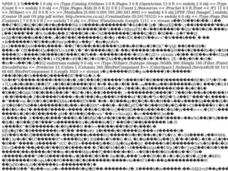EBSCO Industries
Music and Poetry
Song lyrics, like poems, are meant to be heard. After examining the literary devices in several poems, scholars examine the lyrics of popular songs and identify the sound devices and the figurative language writers use to create the...
Academy of American Poets
Teach This Poem: "Spring is like a perhaps hand" by E. E. Cummings
E. E. Cummings' "Spring is like a perhaps hand" offers young scholars an opportunity to try their hands at analyzing a simile. After a warm-up activity and a close reading of the poem, class members discuss what they think the poem is...
Livaudais-Baker English Classroom
An Introduction to Sonnets
What is 14 lines long, written in iambic pentameter, and follows a predetermined rhyme scheme? Introduce scholars to the sonnet, one of the most famous of the fixed-form types of poetry, with a 10-slide presentation that includes the...
Academy of American Poets
Voice
Four lessons make up a poetry unit that introduces high schoolers to spoken and written poetry. Class members also examine poems as social commentary and connect these poems to various novels and plays. A great way to incorporate poetry...
Academy of American Poets
The African American Experience
Disrespect can be as subtle as a frown or a turn of a head. To prepare for a study of Toi Derricote's poem "The Weakness" class members create wordless skits that demonstrate subtle or not so subtle signs of disrespect. After a...
Learning for Justice
Maya Angelou
Maya Angelou's poem, "Still I Rise", offers young scholars an opportunity to consider how poets use literary devices to create powerful messages. After a close reading and discussion of the poem, class members reflect on how they can...
Trinity University
Introduction to Poetry
Introduce fourth graders to poetry with a three-week unit that has them examine the structural elements of poetry, analyze poems, and craft their own original poems rich in sensory details and other poetic devices. Young scholars study...
Penguin Books
An Educator Guide to Call Us What We Carry by Amanda Gorman
Call Us By What We Carry, a poetry collection by Nation Youth Poet Laureate Amanda Gorman, is the focus of a 10-page teacher's guide.
Penguin Books
Teacher's Guide: I Know Why the Caged Bird Sings by Maya Angelous
Maya Angelou's I Know Why the Caged Bird Sings is controversial. Like many other Angelou books, it is frequently challenged or banned from schools. In fact, Angelou is one of the most frequently banned authors in the United States. An...
K20 LEARN
Criminal Motivations: Irony and Characterization In "The Cask Of Amontillado"
Edgar Allan Poe's short story "The Cask of Amontillado" is a bit of a puzzle. Critics have long debated Montresor's motives for killing Fortunato. Young scholars examine examples of the three types of irony (verbal, dramatic, and...
K20 LEARN
Lord of the Flies Unit, Lesson 1: I'm A Survivor
What three readily available things would you grab in case of an emergency? That's the question that launches a unit study of William Golding's The Lord of the Flies. After sharing their choices, class members read Golding's rationale...
K20 LEARN
Texture Poetry: The Great Gatsby and the Sense of Touch
To prepare for crafting a descriptive poem about a character in F. Scot Fitzgerald's The Great Gatsby, groups describe the texture of objects hidden in small bags. Individuals then select a character from the novel and an object...
K20 LEARN
Where I'm From: Poetry
We carry memories of where we're from; tweens and teens can capture these memories by first listening to several memory poems and then crafting their own. They analyze literary devices other poets use, brainstorm a list of images they...
K20 LEARN
Say It with Style: Syntax and Parallel Structure
Dr. Martin Luther King, Jr.'s "I Have a Dream" speech provides the text for a lesson that introduces scholars to the significance of syntax. After examining several types of clauses, phrases, and structures, class members use the...
Curated OER
Abigail and John in Love
The second lesson in the series asks groups to analyze an exchange of love letters between Abigail and John Adams. Scholars identify the many allusions and references in the letters and consider what they can infer about the writers.
Curated OER
Ballad
Young balladeers analyze examples of ballads and generate a list of common traits (story, quatrains, rhyme schemes, refrains, etc.), then identify these traits in Robert W. Service's "The Cremation of Sam McGee" and a ballad written by...
Curated OER
Fish Swimming--A Poem by Moniza Alvi
In this poetry analysis worksheet, students read the poem "Fish Swimming," and discuss the metaphors in the poem. Students complete eight activities based on the poem, including rewriting the subject of the poem and watching two...
Curated OER
Writing Original Literary Texts - The Cuban Crab Migration
Middle schoolers explore figurative language through poetry. In this poetry lesson, students view a video segment regarding the Cuban crab migration. Middle schoolers use similes and metaphors in poetry they create based on the journey...
Curated OER
Literary Analysis of The Minister's Black Veil
Explore the short story "The Minister's Black Veil" by Nathaniel Hawthorne. First, read the short story and take notes on specific uses of the elements of writing such as characters, setting, plot, similes, personification, metaphors,...
Curated OER
Figurative Language-Part 1
Students explore figurative language. In this figurative language lesson plan, students look up, define, and give examples of a list of literary terms.
Curated OER
Searching for Images in Poetry
Students are introduced to the concepts of similes, metaphors and personification. In groups or individually, they read different poems identifying the similes, metaphors and instances of personification in each. They record all answers...
Curated OER
Swirling, Twirling, Glistening Jewels... Glass Art In Words
Young scholars examine the art form of the glass sculpture. After viewing a three dimensional object, they write creatively describing the object through the use of metaphors. They use peer editing to check for grammatical and spelling...
Curated OER
From Ordinary To Extraordinary Writing
Students investigate the quality of writing while focusing on the use of sensory words to convey meaning and ideas. The power of similes and metaphors is emphasized while they create and edit works of writing. The skill of descriptive...
Curated OER
Figurative Language in Poetry and Prose
Students examine the impact of sound devices in poetry. In this poetry lesson, students read the listed poems and identify uses of hyperbole, simile, metaphor, imagery, and personification. Students discuss how sound devices enhance poetry.

























